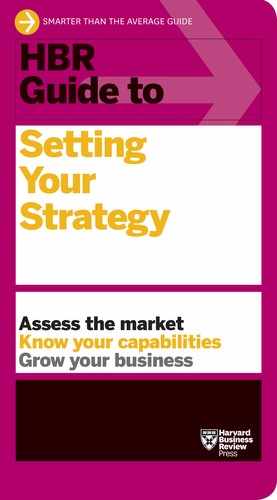CHAPTER 24
Strategy Is All About Practice
by Roger L. Martin
I have never seen anybody become good at strategy without practice. It may happen, but I have never seen it. I doubt that I will see it, because strategy is a discipline. Like any discipline, you have to believe in it and work at it to become skilled; both mindset and effort are required to make progress and become adept at strategy.
The key to the strategy mindset is to view business life as not entirely random; stochastic but not random. While it may be necessary to revisit and revise choices more often than convenient, the assumption holds that effortful, determined, revisable strategy is better than simply letting happen whatever will happen.
By far the easiest thing to do is to see the future as so unpredictable and uncertain that you should keep all your options open and avoid choice-making entirely. The irony, of course, is that not choosing is every bit as much a choice, and every bit as impactful, as choosing to choose.
There is a bit of F. Scott Fitzgerald here: He wrote that “one should . . . be able to see that things are hopeless yet be determined to make them otherwise.” Businesses will evolve and change in ways that make last month’s or last year’s investment decisions look stupid. It will happen, no matter who you are or how smart you are. It happened to Warren Buffett with Salomon Brothers, Dexter Shoes, US Airways, and Conoco. But those are anomalies among the countless other bets that worked out largely as he thought they would. The mindset of a strategist is to hold that just because some bets turn out to be wrong doesn’t mean that the future is entirely unpredictable.
If the first necessary element to being an accomplished strategist is belief, the second is work, work, and work some more. This means making strategy choices, seeing how they work out, and then learning from them. Strategy is part art and part science; a heuristic, not an algorithm. As with most heuristics, you can learn the categories to think about: Pay attention to customers, to competitors, to capabilities, to elements of industry evolution. But there isn’t a learnable formula about how to put them together in any given choice context.
That is what requires practice—and the form of that practice is really important. In golf, you might feel that going to the driving range and hitting a thousand balls is inherently good practice. It isn’t, though, if all you do is go up to the tee, pound the ball as hard as you can, and see whether it went straight and far. If some shots were great and others not so much, what did you learn? Just about nothing, unless you thought in advance about what you were trying to do and what you would pay attention to (for example, head stillness, hip turn, hands leading, etc.). And still, in golf, you probably need a swing coach to watch what you actually do, versus what you hope you are doing, in order to learn something useful.
In strategy, helpful practice means setting out your logic about a choice in advance—for example, “I think consumers will react in this way,” “competitors will react that way,” “we will be able to deliver this,” and “we will achieve this outcome”—and then watching what actually happens against this predicted logic. This is the only way you will learn; the only way you will figure out whether your logic was entirely sound or flawed in some way.
And when I say setting out your logic, I mean writing it down in advance, not just thinking it through. That is important because of our human capacity for ex post facto rationalizing absolutely anything and everything. If you don’t write down in advance what your logic was, you will find that you will convince yourself that everything worked out the way you thought it would—and you will learn nothing. In golf, your swing coach can keep you honest—no, you didn’t lead with your hands through impact. But in strategy, you need to keep yourself honest.
Of course, you can’t ever eliminate chance. You may have made a bet that was a sound one but didn’t pay off this time because you were unlucky. Perhaps it had an 80% chance of paying off, and you fell prey to the 20%. That is why lots of practice and experience is required—they build up your repertoire of bet analysis and observation. The more you practice, the less exposed to chance you’ll be—though it never quite goes away.
Bottom line: If you believe that you can succeed more often than not in dealing with the inherent uncertainty of the future and you practice at laying out your logic, making strategic choices, and assessing the outcomes, you will become an accomplished strategist.
__________
Roger L. Martin is professor emeritus and former dean of the Rotman School of Management at the University of Toronto. He is a coauthor of Creating Great Choices: A Leader’s Guide to Integrative Thinking (Harvard Business Review Press, 2017).
Adapted from content posted on hbr.org, February 20, 2013 (product #H00A2N).
